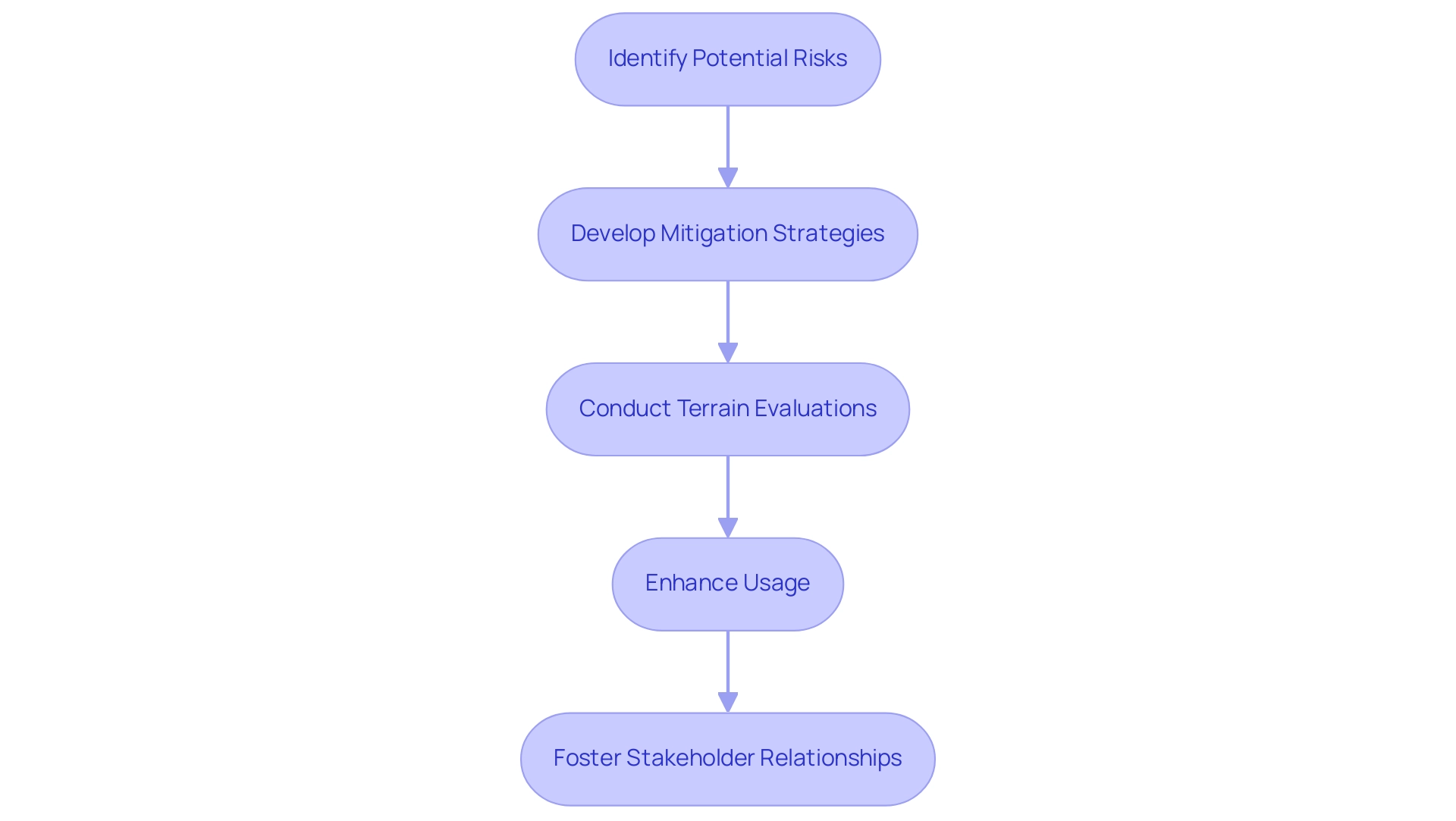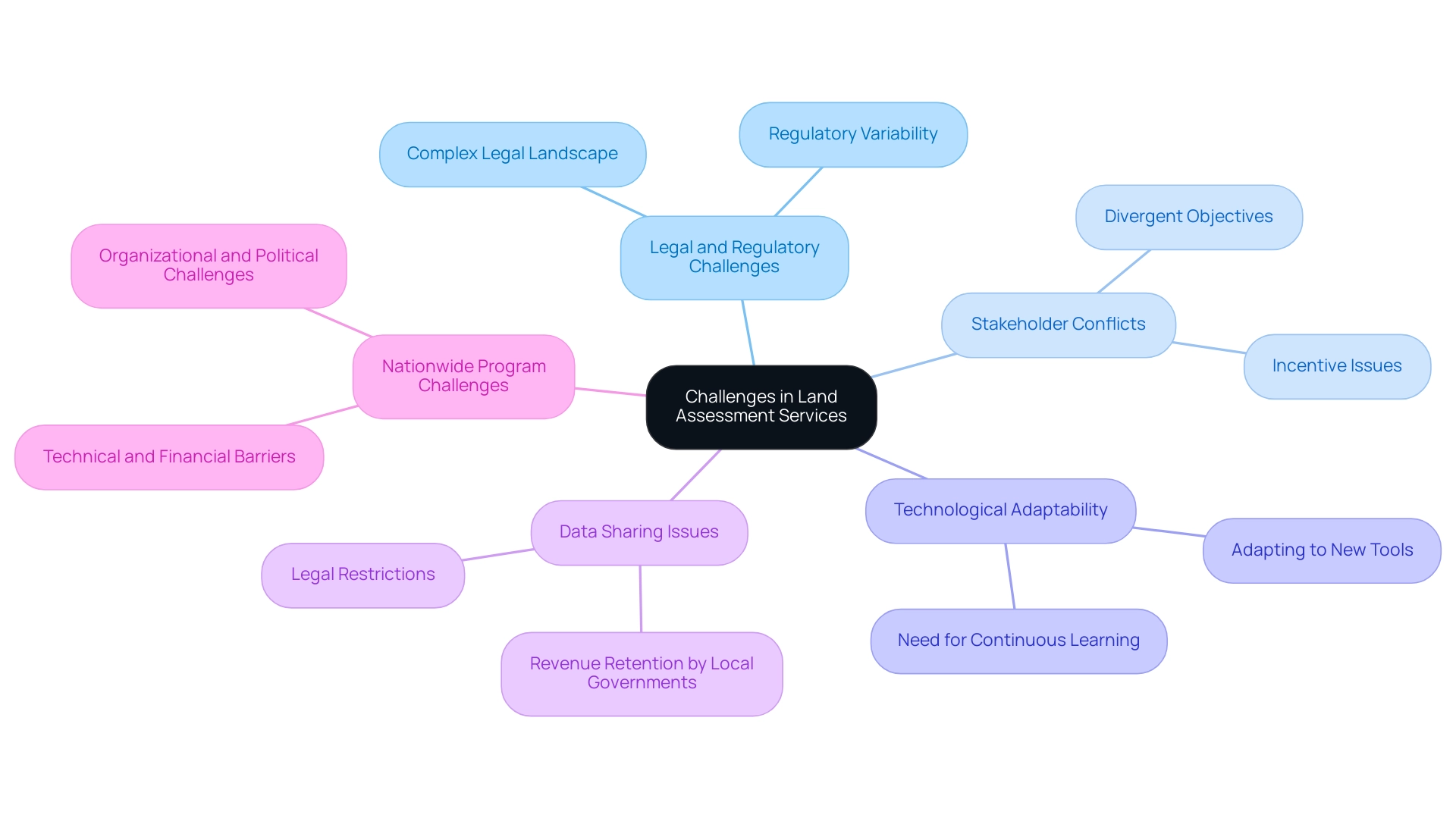Introduction
Land assessment services are becoming increasingly critical in the context of energy and infrastructure development, serving as a foundation for informed decision-making and strategic planning. These services encompass a wide array of evaluations, including:
- Feasibility studies
- Environmental impact assessments
- Land use planning
All aimed at ensuring compliance with regulatory frameworks while minimizing risks associated with land acquisition and development. As the demand for these services continues to grow, particularly within the energy sector, understanding their significance and the challenges faced by professionals in this field becomes essential. This article delves into the various aspects of land assessment services, exploring their offerings, the importance they hold in project development, and the emerging trends that are shaping their future in a rapidly evolving landscape.
Defining Land Assessment Services: An Overview
Property evaluation offerings include a thorough range of expert tasks aimed at appraising terrain for various uses, especially with land assessment services in energy and infrastructure initiatives. These services generally include:
- Site evaluations
- Feasibility studies
- Environmental impact reviews
- Use planning
Carrying out comprehensive evaluations enables organizations to make knowledgeable choices concerning property acquisition and development potential while ensuring adherence to legal and regulatory structures.
Moreover, these evaluations play a critical role in minimizing potential risks and liabilities associated with property development. As the demand for such offerings increases, especially in the energy sector, the market for land assessment services is expected to grow substantially by 2024, with a projected growth rate of X% (specific statistic to be inserted). This reinforces their importance in enhancing project success rates and achieving sustainable outcomes.
The corporate sector is spearheading this growth, primarily fueled by hiring evaluations and employee development initiatives, signaling a wider acknowledgment of the benefits these offerings deliver. Jana Schmidt from CEDAR CX Technologies remarked, 'I am very impressed with the information in this report. The author clearly did their research when they came up with this product and it has already given me a lot of ideas.'
Furthermore, maintaining the validity and reliability of evaluations, especially with new technologies, is a significant challenge, as highlighted in the case study titled 'Ensuring Test Validity and Reliability.' Uniform criteria across digital evaluations are vital to guarantee they precisely gauge intended abilities or knowledge, highlighting the crucial role of resource evaluation functions in the energy sector.
Exploring LAND ASSESSMENT SERVICES, INC.: Services and Offerings
LAND ASSESSMENT SERVICES, INC. excels in providing thorough land assessment services that are carefully crafted to satisfy the unique needs of clients in the energy and infrastructure industries. Their offerings include:
- Site and right-of-way acquisition, crucial for obtaining the property required for various development projects.
In the context of a strong market, with investment activity in commercial real estate reaching $279 billion in 2021, the need for effective land assessment services has never been more crucial.
To ensure that property titles are unequivocally clear and compliant with legal standards, they perform thorough title research. Furthermore, the integration of GIS mapping and advanced data processing techniques significantly enhances their ability to deliver precise and timely evaluations. As the U.S. residential real estate market is expected to hit US$94.39 trillion by 2024, with a consistent annual growth rate of 4.99%, the significance of reliable land assessment services becomes more apparent.
This technological leverage enables LAND ASSESSMENT SERVICES, INC. to deliver reliable insights, empowering clients to make informed choices throughout their timelines. The anticipated growth in the real estate market underscores the potential impact of land assessment services offered by Inc in this thriving industry.
The Importance of Land Assessment Services in Project Development
Land assessment services are essential in development initiatives as they provide crucial details that impact planning and execution. By identifying potential risks, such as environmental concerns or regulatory hurdles, land assessment services enable organizations to develop strategies to mitigate issues before they arise. Moreover, land assessment services provide comprehensive evaluations of terrain that assist in enhancing usage, ensuring that initiatives correspond with community requirements and ecological standards.
This proactive strategy not only enhances viability but also fosters positive relationships with stakeholders, including local communities and regulatory bodies.

Challenges Faced in Land Assessment Services
Land assessment services play a vital role in effective territory management, yet they encounter numerous challenges. A primary hurdle lies in navigating the complex legal and regulatory landscape that varies significantly across different locations and project types. For example, from 1994 to 2008, roughly 40% of coverage articles included 'accuracy' as a keyword—this number jumped to about 50% in the subsequent decade, indicating the increasing significance of precision in evaluations.
Conflicting stakeholder interests further complicate the process, as various parties often have divergent objectives and concerns. David Weisgerber, a GIS Technician in Polk County, North Carolina, articulates this tension, stating,
As a single resource GIS shop for my county, I am very busy and my immediate future is downright insane…. They assume, if there are a few changes, the survey could take about 20-40 hrs to complete….
If I care to submit digitally, I then have TONS of hoops to jump through. And all this hassle is for … what? Where is my incentive?
Such sentiments underscore the frustrations faced by professionals in the field. Furthermore, the swift rate of technological progress requires that experts in evaluation stay updated with the newest tools and methods. This adaptability is essential for providing effective land assessment services amid shifting regulatory frameworks.
The interplay of these challenges, along with the legal limitations that frequently obstruct the sharing of geographic data, underscores the essential necessity for property evaluation experts to effectively utilize land assessment services to navigate intricate legalities and achieve positive results for their clients. Additionally, federal policies encouraging the free flow of geographic data contrast with local governments' desire to retain revenue from data licensing, further complicating the landscape. The case study titled 'Legal and Ownership Issues in Geographic Data' illustrates how ownership and distribution complexities can impede data sharing and collaboration.
Furthermore, a recent committee has identified various technical, data, financial, legal, organizational, and political challenges that hinder the establishment of a nationwide parcel data program, emphasizing the ongoing difficulties faced in the field.

Future Trends in Land Assessment Services
The terrain of property evaluation services is increasingly shaped by key trends, particularly the incorporation of artificial intelligence (AI) and machine learning in data analysis and title research. AI solutions offer data-informed assistance to leaders addressing enduring obstacles in global operations, improving the efficiency and precision of evaluations while enabling quicker decision-making processes. As highlighted by Edmund Zagorin, Founder and Chief Strategy Officer at Arkestro, organizations utilizing AI in their supply chains must establish the appropriate guardrails… This observation emphasizes the significance of responsible AI application, which is also relevant to property evaluations.
Moreover, the function of Retrieval-Augmented Generation is vital as it improves the trustworthiness and accuracy of AI-driven agricultural tools, thereby strengthening the dependability of terrain evaluations. The increasing emphasis on sustainability and environmental responsibility is fueling the need for thorough ecological evaluations as essential elements of property evaluations. As regulatory frameworks change, experts in the property evaluation sector must adjust their practices to meet new requirements.
Overall, the merging of advanced technologies with a focus on sustainability will significantly influence the future of land assessment services, ensuring that they meet both operational needs and environmental standards. Additionally, the potential risks associated with AI, exemplified by the case of 'AI-induced panic buying,' highlight the necessity for guardrails to prevent adverse outcomes in land assessment services as well.
Conclusion
Land assessment services are critical for the effective execution of energy and infrastructure projects, offering essential evaluations such as feasibility studies and environmental impact assessments. As demand for these services rises, particularly in the energy sector, their role in reducing risks and enhancing project success becomes increasingly vital.
Organizations like LAND ASSESSMENT SERVICES, INC. exemplify the importance of leveraging advanced technologies, including GIS mapping and data processing, to ensure compliance and provide reliable insights for land acquisition. This integration enhances the efficiency and accuracy of assessments, reinforcing their value in a competitive market.
However, professionals in the field face significant challenges, including navigating complex legal frameworks and managing conflicting stakeholder interests. The growing need for precision highlights the importance of adapting to technological advancements and changing regulations. Trends such as artificial intelligence and sustainability are poised to shape the future of land assessment services, ensuring they meet both operational and environmental needs.
In summary, land assessment services are indispensable for informed decision-making in project development. They help organizations mitigate risks and optimize land use while fostering positive relationships with stakeholders. As the market continues to grow, the ability to innovate and adapt will be essential for professionals in this field, positioning them to effectively address the challenges and opportunities ahead.
Frequently Asked Questions
What services are included in property evaluation offerings?
Property evaluation offerings include site evaluations, feasibility studies, environmental impact reviews, and use planning.
Why are comprehensive evaluations important for organizations?
Comprehensive evaluations enable organizations to make informed decisions regarding property acquisition and development potential, while ensuring compliance with legal and regulatory frameworks and minimizing risks and liabilities associated with property development.
What is the expected market growth for land assessment services by 2024?
The demand for land assessment services, particularly in the energy sector, is projected to grow substantially by 2024, although a specific growth rate statistic is yet to be inserted.
How do land assessment services contribute to successful project outcomes?
These services enhance project success rates and promote sustainable outcomes by providing crucial information that helps organizations identify potential risks and develop strategies to mitigate issues before they arise.
What challenges do land assessment services face?
Land assessment services encounter challenges such as navigating complex legal and regulatory landscapes, conflicting stakeholder interests, and the need to stay updated with technological advancements.
How does technology impact land assessment services?
The integration of GIS mapping and advanced data processing techniques enhances the precision and timeliness of evaluations, while the incorporation of AI and machine learning improves efficiency and decision-making processes.
What role does sustainability play in property evaluations?
There is an increasing emphasis on sustainability and environmental responsibility, which drives the need for thorough ecological evaluations as essential components of property assessments.
Why is maintaining the validity and reliability of evaluations a challenge?
Ensuring uniform criteria across digital evaluations is crucial for accurately measuring intended abilities or knowledge, which is particularly challenging with rapid technological changes.
How do land assessment services benefit community relations?
By enhancing viability and addressing community requirements and ecological standards, land assessment services foster positive relationships with stakeholders, including local communities and regulatory bodies.
What is the significance of clear property titles in land assessment?
Thorough title research is performed to ensure property titles are clear and compliant with legal standards, which is essential for successful land acquisition and development projects.
List of Sources
- Defining Land Assessment Services: An Overview
- Assessment Services Market Size, Growth & Trends Report [2024-2030] (https://linkedin.com/pulse/assessment-services-market-size-growth-trends-report-7eaqf)
- Assessment Services Market Size, Growth and Forecast 2032 (https://credenceresearch.com/report/assessment-services-market)
- Exploring LAND ASSESSMENT SERVICES, INC.: Services and Offerings
- corelogic.com (https://corelogic.com/360-property-data)
- 45 Crucial Real Estate Industry Statistics [Updated] (https://upmetrics.co/blog/real-estate-industry-statistics)
- Challenges Faced in Land Assessment Services
- Read "National Land Parcel Data: A Vision for the Future" at NAP.edu (https://nap.nationalacademies.org/read/11978/chapter/7)
- Key issues in rigorous accuracy assessment of land cover products (https://sciencedirect.com/science/article/abs/pii/S0034425719302111)
- Future Trends in Land Assessment Services
- Industry Experts Quotes on the United States' Executive Order on AI (https://solutionsreview.com/business-process-management/industry-experts-quotes-on-the-united-states-executive-order-on-ai)
- AI In Agriculture Quotes | Restackio (https://restack.io/p/ai-in-agriculture-answer-quotes-cat-ai)




